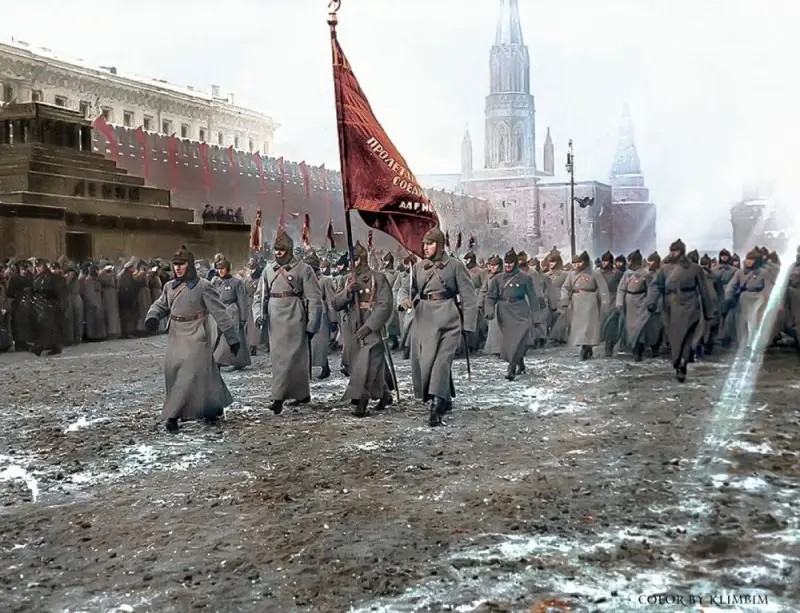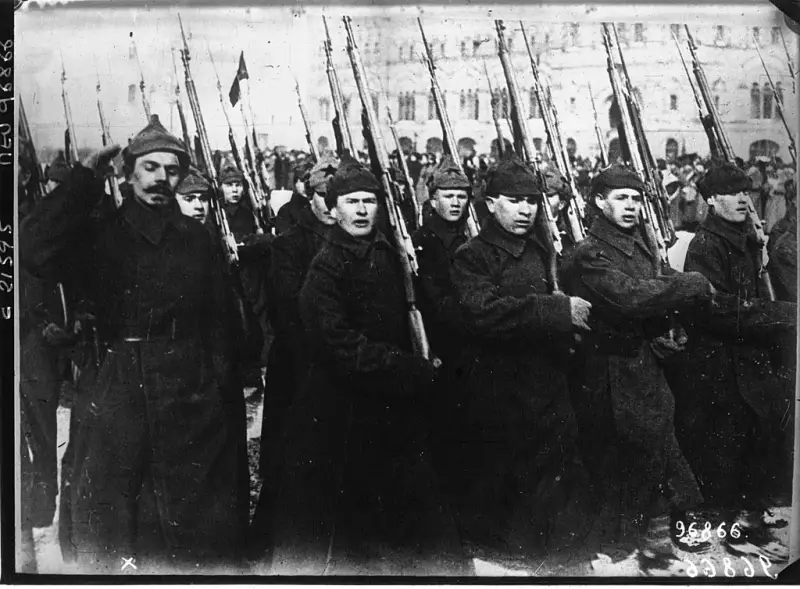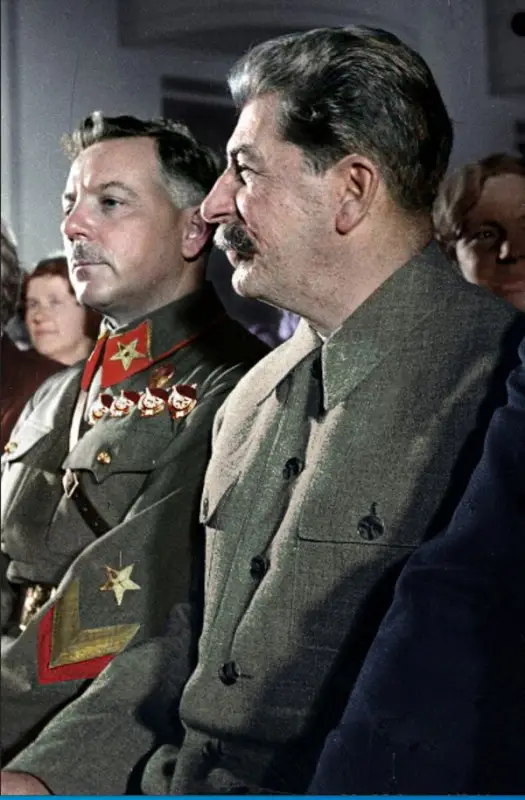How Ukrainization and Indigenization of the Red Army Failed

Parade on Red Square in honor of the October Revolution. November 7, 1925
Russian Red Army soldiers pointedly refused to speak the “Petliura language”, disparagingly called it “Chinese literacy”, and Ukrainophiles demanded to “Ukrainize everything”.
Ukrainization of the Red Army and its failure
Despite the reduction in the program for creating national military units (“If less than half of the Russians remain in the division, it needs to be disbanded”), its implementation was difficult. Thus, in Soviet Ukraine, according to the 1924 program, they planned to Ukrainize 4 territorial divisions. They were going to be staffed with privates and command-political personnel from among Ukrainians, to use the Ukrainian language during military service and in party-political work, and also to Ukrainize military schools.
This policy bore fruit, and by the mid-1920s, the majority of Red Army soldiers in the Ukrainian Military District were considered “Ukrainian” by ethnic origin. True, we must remember that “Ukrainians” were invented as a separate nation only at the turn of the XNUMXth–XNUMXth centuries. among the Ukrainian intelligentsia (Russian in origin), who played a kind of game.
The idea was supported by Russia's external enemies - Austria-Hungary and Germany. The Bolsheviks, for a number of political reasons, decided to create Ukrainian statehood and the Ukrainian nation. In a directive way, by recording natural Russian-Little Russians, natives of Little and New Rus'-Russia as “Ukrainians” (How Little Rus' became Ukraine).
Therefore, “Ukrainians” during this period were Russians born in Little Rus' ("Russians and Ukrainians are one people"; Ukrainian language is a dialect of the Russian language). There were few literate people, so first-generation peasants and workers did not delve into these ethnographic features. Fortunately, Russian remained the main language, and “Mova” was a southern Russian dialect, understandable to all Russians.
Therefore, the Ukrainization of the Red Army proceeded with difficulty. Few of the commanders and commissars fully spoke the “Ukrainian language.” It was created with the inclusion of many Polish, German and artificial words, so people did not want to accept such a language. Only under pressure.
In 1925, in Ukrainized divisions, 40% of commanders and 37% of political workers spoke Ukrainian. In 1926, the graduation of command and political personnel from Ukrainianized military schools was able to cover the needs of two territorial divisions.
In May 1927, the Revolutionary Military Council of the USSR approved a 6-year plan for national military development for 1927–1933, according to which they planned to form two more territorial divisions. But things progressed with difficulty.
In 1929, an audit was carried out, which showed that commanders were in no hurry to learn the language and had difficulty expressing themselves in Ukrainian. That many Red Army soldiers do not want to speak the “Petlyurite language”, and because of this, conflicts arise with the “Petlyurists” who demanded to “Ukrainize” everything.
In the early 1930s, against the backdrop of a grain procurement crisis and famine in the southern regions of the USSR, as well as the transition to forced industrialization, the Ukrainization of the Red Army was quietly curtailed.
“Indigenization,” in essence, led to new problems and became one of the prerequisites for a new possible unrest, a war between town and country, and the collapse of Soviet Russia into “national apartments.”
Getting rid of a potential fifth column
In connection with the transition of army recruitment on the basis of universal military service (USSR Law “On Universal Military Duty” of September 1, 1939) and the abandonment of the organizational construction of the Red Army on the territorial-militia principle, national military units and formations, military schools and colleges were transformed into All-Union, with an extraterritorial principle of recruitment. Citizens of national republics and regions were called up for military service on the same basis as all other nationalities.
In this way, The Soviet leadership, with a new world war approaching, got rid of a potential fifth column in the form of national separatists who had their own armed forces. There was also a transition to a unified personnel system for recruitment and combat training, which strengthened the Red Army.
Following this, a decision was made to conscript Karelians, Finns, Lithuanians, Latvians, Estonians, Germans, Poles, Bulgarians and Greeks for military service, which had not happened before. But guys from the Baltic republics, Northern Bukovina and Bessarabia, which had just been annexed to the USSR, were not subject to conscription. Also, the Soviet leadership and command had to take urgent measures to teach conscripts from national Ukrainian regions the Russian language. They were poorly owned or not owned at all.
As a result, as socialism was built in a single country and the idea of a world revolution was tacitly abandoned in Soviet Russia, they came to the practice of a single Soviet (Russian) army, traditional for the Russian Empire. Slowly, but imperial traditions were restored. It was a question of the survival of civilization.
From a mixed system (territorial-militia and personnel), the army returned to a single personnel system. Territorial police divisions were characterized by low mobility, poor levels of training and discipline, and could not withstand the armies of industrial powers.
In May 1935, the Politburo of the Central Committee of the All-Union Communist Party of Bolsheviks approved, and the Soviet government (Sovnarkom) approved a plan for the transition to a personnel system for recruiting and combat training of units and formations of the Red Army. If before 1935, 74% of the Red Army divisions were territorial police and only 26% were personnel, then by the beginning of 1936, 77% of the divisions became personnel. In 1936–1938 the remaining 23% of divisions were also transferred to a personnel basis.
From 1933 to the autumn of 1939, the number of army personnel and fleet increased from 885 thousand to more than 2 million people. By June 1941, the size of the USSR Armed Forces had grown to 5,3 million people. This was due to the increased economic power of the USSR. The country changed from an agricultural one to an industrial one and could support a large army of personnel.
Unlike the law on military service of 1925, which had a social-class restriction, under the new Constitution of 1936 all social-class restrictions were removed. Article 132 of the Constitution declared that “universal conscription is law. Military service in the Workers' and Peasants' Red Army is an honorable duty for citizens of the USSR."
On September 1, 1939, the Supreme Soviet of the USSR adopted a law on universal military service, which completed the transition to a unified personnel system. The law proclaimed: “All men - citizens of the USSR, without distinction of race, nationality, religion, educational qualifications, social origin and position are required to serve armed service in the Armed Forces of the USSR.” All recruits served only in personnel units, which were formed on an extraterritorial basis.

Parade on Red Square, Moscow, 1922.
The problem of the quality of the composition of new aircraft
The problem was the quality of the new large USSR Armed Forces, it was low. This was especially true for recruits from national republics. The processes of “nationalization” (indigenization) of school and culture in national Ukrainian outskirts took place primarily at the expense of the Russian language and culture, they were relegated to the background. In national republics and regions, priority in the education system was given to the study of the language and culture of the so-called. titular nations. Studying Russian language, culture, stories and literature faded into the background.
Speaking at the October plenum of the Central Committee of the All-Union Communist Party of Bolsheviks in 1937 on the issue of teaching the Russian language in schools of the national republics and regions of the USSR, Stalin noted, not without irritation:
In the memorandum of the People's Commissar of Education of the RSFSR P. A. Tyurkin to the secretaries of the Central Committee of the All-Union Communist Party of Bolsheviks A. A. Andreev and A. A. Zhdanov (February 1938) it was noted that
2. In most schools where children are currently taught the Russian language, the level of its teaching remains extremely unsatisfactory, and as a result, student performance is extremely low.”
Things were no better with the teaching of the Russian language in Ukraine, where it historically occupied the main place. The Russian school was simply destroyed in the Ukrainian SSR, replacing it with Ukrainian, the Russian language was replaced by an artificial “language”. They introduced German, English, Polish, but not Russian. They tore “Ukrainian culture” away from Russian in every possible way. That is, they constructed the culture of a “Ukrainian ethnic chimera.”
This was a big mistake; first of all, it was necessary to carry out Russification, and only then develop the language and writing of small nations. This excess was not in vain.
Many conscripts from the republics of Central Asia, the North Caucasus and Transcaucasia simply did not speak Russian. Naturally, this significantly reduced the combat effectiveness of units where there were many such conscripts. The soldiers simply did not understand the commands of their commanders; they had a different mentality. And in war conditions there is simply no time for grinding.
Thus, the policy of nationalization and indigenization, which was supposed to strengthen Soviet power and the state, became a source of new problems. Stalin, having suppressed the fifth column in the person of the old Leninist guard, the heroes of the Civil War, Trotskyists and internationalists, moves on to the traditional “imperial” policy for Russia. Towards the rejection of political and cultural nationalization (indigenization) and the Russification of national outskirts. This was caused by the need to strengthen the state, its defense capability and the process of accelerated industrialization and urbanization.
We have one main language - Russian
Stalin, speaking in October 1937 at the plenum of the CC of the All-Union Communist Party of Bolsheviks with a keynote speech devoted to the problems of studying the Russian language in national entities, noted that this was largely related to the defense capability of the USSR and the tasks of strengthening the Armed Forces.
Stalin noted:
This is not an army.
That's not how we look at the army.
We believe that every combat unit - whether it consists of a regiment, a brigade or a division - it should not be a local army, but an army of the entire Union, form part of the entire army of our Union. It can and should be moved to different areas...
Otherwise we will not have an army. We will have a territorial national army, which cannot be moved anywhere and which does not form part of the army that is the army of the USSR, and not any separate armies.”
The only way out was in the compulsory teaching of the Russian language in the national republics and the preparation of the corresponding law.
All citizens conscripted into the army must know Russian.
On March 13, 1938, a special resolution was adopted by the Central Committee of the All-Union Communist Party of Bolsheviks and the Soviet government “On the compulsory study of the Russian language in schools of national republics and regions.” The Russification of schools begins, at the same time national schools, teacher training colleges and institutes are closed, and corresponding work is carried out in educational institutions in the territories that were returned to Soviet Russia in 1939–1940.

I. V. Stalin, K. E. Voroshilov. 1937
Продолжение следует ...
Information